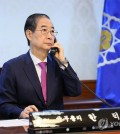- California Assembly OKs highest minimum wage in nation
- S. Korea unveils first graphic cigarette warnings
- US joins with South Korea, Japan in bid to deter North Korea
- LPGA golfer Chun In-gee finally back in action
- S. Korea won’t be top seed in final World Cup qualification round
- US men’s soccer misses 2nd straight Olympics
- US back on track in qualifying with 4-0 win over Guatemala
- High-intensity workout injuries spawn cottage industry
- CDC expands range of Zika mosquitoes into parts of Northeast
- Who knew? ‘The Walking Dead’ is helping families connect
Yoon wraps up NATO summitry focusing on cooperation against N. Korea-Russia alignment
South Korean President Yoon Suk Yeol concluded his trip to the United States Thursday, rallying support from North Atlantic Treaty Organization (NATO) members to counter deepening military cooperation between North Korea and Russia, and reaffirming his diplomatic credo based on universal values.
Yoon attended the NATO summit in Washington, where the leaders of the 32-member alliance and its four Indo-Pacific Partners — South Korea, Japan, Australia and New Zealand — discussed cooperation in supporting Ukraine and addressing a series of shared challenges, including disinformation and cybersecurity.
His attendance at the summit came after Russian President Vladimir Putin and North Korean leader Kim Jong-un signed a “comprehensive strategic partnership” treaty during their summit in Pyongyang last month, escalating concerns about the security implications of their military alignment.
On the margins of the summit, he met bilaterally with a series of world leaders, including U.S. President Joe Biden, NATO Secretary General Jens Stoltenberg and Japanese Prime Minister Fumio Kishida.
During a meeting on Thursday, Yoon and Biden reiterated their readiness to face down North Korean threats, warning that any North Korean nuclear attack against South Korea will be met with a “swift, overwhelming and decisive” response.
“Biden reiterated that the U.S. commitment to extended deterrence to the ROK is backed by the full range of U.S. capabilities, including nuclear,” the leader’s joint statement read. “Yoon reiterated that the ROK’s full range of capabilities will greatly contribute to the alliance’s combined defense posture.”
ROK and DPRK stand for the official names of South Korea and North Korea, the Republic of Korea and the Democratic People’s Republic of Korea, respectively.
The summit between Yoon and Biden coincided with the signing of the allies’ joint nuclear deterrence guidelines in a milestone of bilateral endeavors to sharpen cooperation against evolving North Korean nuclear and missile threats.
Also on Thursday, Yoon and the NATO secretary general met and reached an agreement on the sharing of information regarding North Korean weapons used in Russia’s war in Ukraine.
On Wednesday, Yoon and Kishida met bilaterally and agreed to reinforce security cooperation with the transatlantic alliance as Seoul and Tokyo have been aligning themselves closely to tackle Pyongyang’s advancing threats.
During a NATO public forum on Thursday, Yoon took a swipe at burgeoning cooperation between Russia and North Korea, calling it a “collusion of convenience.”
“Russia wants North Korea to actively engage in anti-American, anti-Western rhetoric while serving as its arsenal,” he said. “North Korea hopes that Russia will provide it with advanced military technology and energy resources and also help them weaken the monitoring of the U.N. Security Council (UNSC) sanctions.”
At the forum, he also voiced concerns over “new and challenging forces” that reject an “international order based on universal values and norms.”
“Autocratic regimes maintain their power by restricting freedoms of their own citizens and subjecting them to constant surveillance. The collusion of those who advocate for altering the status quo through force directly challenges the peace and prosperity established by the free world,” he said.
“At this moment, the security of both Europe and Asia is a simultaneously under threat. This is why IP4 countries have attended the NATO summit for the third consecutive year.”
IP4 refers to NATO’s four Indo-Pacific partners — South Korea, Japan, Australia and New Zealand.
While in Washington, he also met with other foreign counterparts, including Czech President Petr Pavel.
In his meeting with Pavel, Yoon highlighted South Korea’s nuclear technology, production capacity and financial packages needed to build advanced nuclear reactors, Park Chung-sup, senior presidential secretary for economic affairs, told reporters in a briefing.
The talks come as South Korea’s state-run Korea Hydro & Nuclear Power and France’s state-owned utility EDF are competing to win the bid to build four 1,200-megawatt nuclear reactors in Czech.
Before arriving in the U.S. capital, Yoon visited U.S. Indo-Pacific Command in Hawaii, where he stressed the importance of combined defense capabilities between South Korea and the U.S. to counter North Korean threats.











